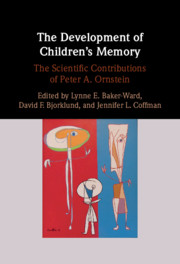Book contents
- The Development of Children’s Memory
- The Development of Children’s Memory
- Copyright page
- Dedication
- Contents
- Figures
- Tables
- Contributors
- Part I Backdrop
- Part II Children’s Memory Strategies
- Part III Children’s Event Memory
- Chapter 7 Children’s Reports of Personal Experiences
- 1Chapter 8 Children’s Memory for Instances of Repeated Events
- Chapter 9 Everyday Conversations as a Source of False Memories in Children
- Chapter 10 Commentary
- Part IV Family Socialization of Memory
- Part V Classroom Socialization of Memory
- Part VI Perspective
- References
- Index
Chapter 9 - Everyday Conversations as a Source of False Memories in Children
Implications for the Testimony of Young Witnesses
from Part III - Children’s Event Memory
Published online by Cambridge University Press: 28 May 2021
- The Development of Children’s Memory
- The Development of Children’s Memory
- Copyright page
- Dedication
- Contents
- Figures
- Tables
- Contributors
- Part I Backdrop
- Part II Children’s Memory Strategies
- Part III Children’s Event Memory
- Chapter 7 Children’s Reports of Personal Experiences
- 1Chapter 8 Children’s Memory for Instances of Repeated Events
- Chapter 9 Everyday Conversations as a Source of False Memories in Children
- Chapter 10 Commentary
- Part IV Family Socialization of Memory
- Part V Classroom Socialization of Memory
- Part VI Perspective
- References
- Index
Summary
Research on factors that can affect the accuracy of children’s autobiographical remembering has important implications for understanding the abilities of young witnesses to provide legal testimony. In this chapter, I review our own research inspired by Professor Ornstein’s information-processing framework for examining children’s memory. Specifically, I focus on one factor that has much potential to influence how children remember their experiences, namely everyday conversations with peers and parents. Our studies show not only that the content of natural conversations can shape children’s event memory but that such exchanges can prompt the generation of entirely false narratives that are more detailed than true accounts of experience. Further, our work demonstrates various factors that can boost the damaging effects of conversationally conveyed misinformation. Implications of this collection of findings for children’s testimony are discussed.
- Type
- Chapter
- Information
- The Development of Children's MemoryThe Scientific Contributions of Peter A. Ornstein, pp. 132 - 151Publisher: Cambridge University PressPrint publication year: 2021

